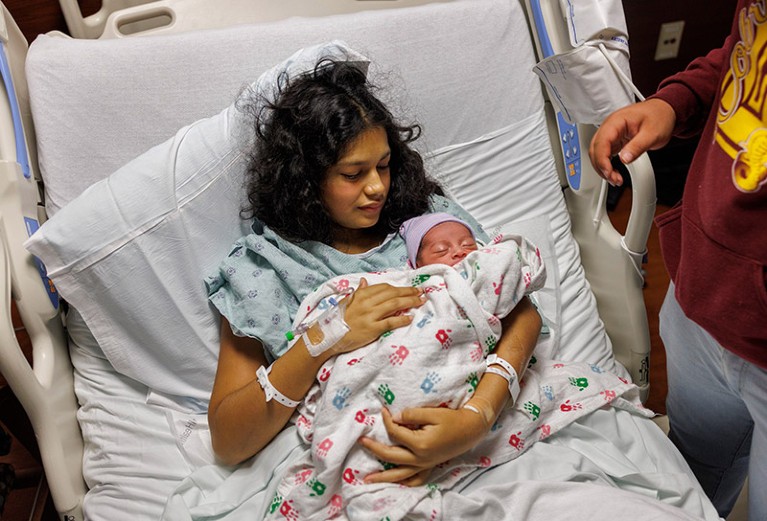[ad_1]

Giving birth shifts a person’s DNA markings back toward a more youthful state, but this trend is less noticeable in new birth parents with obesity.Credit: Chicago Tribune/Getty
Aches and pains aren’t all that pregnancy shares with ageing. Brewing a baby leads to changes in the distribution of certain chemical markers on a pregnant person’s DNA — changes similar to those that are a hallmark of getting older. But new research shows that, several months after a person gives birth, the chemical patterns revert to an earlier state1. The results strengthen previous work in mice and preliminary results in humans2.
It’s not surprising that pregnancy takes a toll, but the reversal was “somewhat unexpected”, says perinatal-health specialist Kieran O’Donnell at Yale University in New Haven, Connecticut, a co-author of the study. It was published 22 March in Cell Metabolism.
Aged DNA
The chemical tags analysed in the study are called methyl groups, and they are added to DNA in a process called methylation. They are one example of the ‘epigenome’, features of DNA that change gene activity without altering the genetic code.
Extreme morning sickness? Scientists finally pinpoint a possible cause
DNA-methylation patterns can be used to estimate a person’s ‘biological age’, which reflects the physiological stresses that a person’s body has accrued over time. Some research has found that biological age is a better predictor of health problems such as cardiovascular disease3 and dementia4 than a person’s chronological age.
But unlike chronological age, “biological age is quite flexible; it’s a fluid parameter. It can go up and down”, says biomedical scientist Vadim Gladyshev at Harvard Medical School in Boston, Massachusetts. Last year, his team published a study in Cell Metabolism2 that noted a decrease in biological age after pregnancy in mice and suggested that there could be a similar effect in humans. Cessation of several other stressful conditions also reversed biological age.
Obesity’s effect
The new study confirmed Gladyshev and colleagues’ results in humans and also showed that not everyone bounces back from pregnancy to the same degree. People who were at the cusp of obesity before pregnancy shed fewer years of biological age in the three months after birth than did people who had a body weight classified as “normal,” O’Donnell and his colleagues found. Meanwhile, people who breastfed exclusively experienced a greater reduction in biological age than did those who used formula or a mix of formula and breast milk.
Some participants’ biological ages were a few years younger postpartum than in early pregnancy. That’s “one thing that caught my eye”, says ageing-biologist Yousin Suh at Columbia University in New York City, who was not involved in the work.
The researchers didn’t measure the biological age of participants before pregnancy, so “we can’t claim that this is a rejuvenation effect”, O’Donnell says. But the data are suggestive, and he’d like to follow up with the participants in the future.
Not to worry
Interpreting Gladyshev and O’Donnell’s findings is tricky, some researchers say. Methylation clearly changes during pregnancy, but “we would be wrong to assume pregnancy is a state of accelerated ageing”, says Dena Dubal, a physician-scientist and specialist in ageing at the University of California, San Francisco. Dubal thinks that methylation might not be a hallmark of ageing but could instead underlie some of the sweeping changes that the body must undergo to support a growing fetus, such as altered gene expression.
Suh isn’t so sure. “Methylation is, thus far, one of the most robust markers of biological age,” she says.
‘Inflammation clock’ can reveal body’s biological age
Whether a reversible state can truly be called “age” is “a really important point”, O’Donnell says. “Perhaps as we begin to focus on pregnancy as a new area for ageing research, maybe there’s new terms and terminology that will need to be developed.”
In the end, people shouldn’t worry about any pregnancy-related increase in their biological age, scientists say. “We are talking about, you know, changes of about two, three years,” Gladyshev says.
And Dubal points out that pregnancy should not be conceptualized as a biological problem, even for people who don’t maximize recovery by breastfeeding. “While the benefits of breast feeding are many, its absence is not a dangerous predicament,” she says.
[ad_2]
Source Article Link



